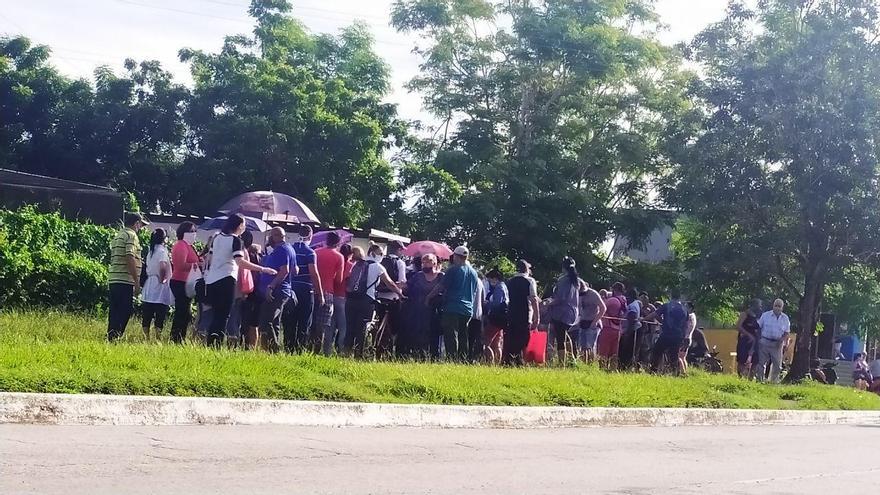
![]() 14ymedio, Havana/Sancti Spíritus, 20 July 2020 — Since before dawn on Monday, the same scenes repeated themselves throughout the Island in front of the new divisa (hard-currency) shops: people lining up before the 9:00 a.m. opening, much police surveillance and, finally, not one single piece of chicken, the favorite product. The 14ymedio reporters confirmed this in several shops in Havana and the provinces.
14ymedio, Havana/Sancti Spíritus, 20 July 2020 — Since before dawn on Monday, the same scenes repeated themselves throughout the Island in front of the new divisa (hard-currency) shops: people lining up before the 9:00 a.m. opening, much police surveillance and, finally, not one single piece of chicken, the favorite product. The 14ymedio reporters confirmed this in several shops in Havana and the provinces.
The first light of day barely began to outline the contours of a park near the market of Boyeros and Camagüey in Havana, one of the places chosen on July 20 to offer food, domestic appliances and cleaning and personal hygiene products in “freely convertible money” (MLC), using debit cards.
Before 7:00 in the morning, more than 200 anxious clients had already accumulated in a scattered and chaotic line. Most of them were trying to shelter from the rising sun and the swarms of mosquitos that were taking advantage of all those bodies gathered together.
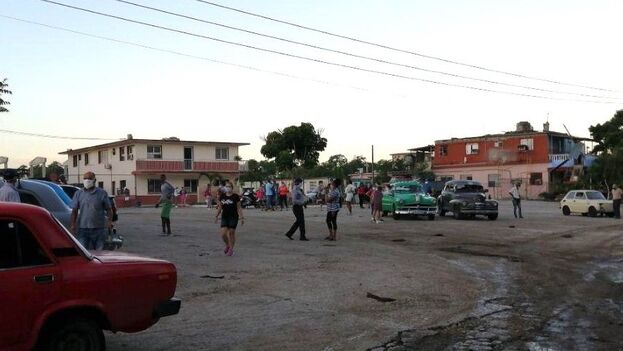
A little later, an employee accompanied by a police official with two stars on his lapel approached the beginning of the line and began to assign the first 100 people to enter the shop in a group. The customers asked so many questions that the handover of the numbered tickets was interrupted several times by calls for silence and calm from the police official, who threatened to stop assigning numbers if they didn’t cool it.
Then came an employee who presented himself as the “head of the business” and addressed the line near the police, to explain the details of what was for sale. Now the sun was burning everyone’s shoulders, adding one more hardship for hundreds of customers who, upon arriving, were warned that they couldn’t take photos and would only be allowed to pass in a group when the previous one left.
“This shop has two categories: the sale of electronics, in addition to food and cleaning products,” screamed the employee so the whole line could hear. “This means that, for the sake of control over the electronics, the first 10 in line must hand over their identity cards to make sure they can get domestic appliances.” To the surprise of those who were waiting patiently, he added, “Just because we sell in MLC doesn’t mean that things aren’t limited.”
There followed an extensive explanation about the rationed equipment. “The air conditioners are limited to four per person; right now we have eight freezers in the shop, and more will be coming this week.” But cold water was really thrown on everyone when he said: “We can’t sell chicken. Until they supply all the shops in the country with chicken, we can’t.” A murmur of resistance came from the crowd.
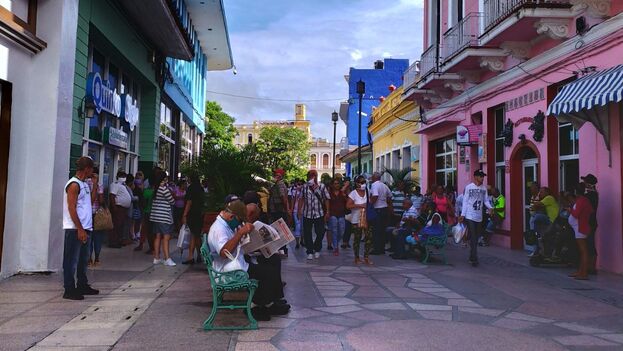
“It’s the same line everywhere,” someone declared. “There are fryers but no refrigerators. We have a virtual shop, Almacén Habana, and the articles they sell on the website are the same ones they have here.”
The panorama at that hour was quite different outside the Doble Nueve shop, on Havana Boulevard, which was selling personal hygiene and cleaning products in MLC. Without customers, the morning’s peace was interrupted only by a police presence and the questions of some curious people who were passing by. The possible reason for the contrast is the shop’s location in the municipality of Centro Havana, where a low-income population resides.
The situation repeated itself at the nearby shop La Arcada on the same street, where the neighbors preferred to continue their daily activities earlier in the morning before stopping at the shop windows, where plenty of preserves, pasta and grains were on display.
At Línea and 12, the central corner of Vedado, the buying power of the district was noticeable. Some 100 people were waiting to enter the shop; they already knew by the rumors that there was beef, ground turkey and cheese in the refrigerators, plus shampoo, a product that has disappeared from the Cuban convertible (CUC) and Cuban peso (CUP) shops in the last weeks.
“There’s no powdered milk, only evaporated,” warned a beleaguered customer who approached to talk with the first buyer who left the shop, with two bags half-full. “She told me that what they have is more or less the same that they had some years ago in the shoppings (the CUC stores), no more no less,” says the woman.
“I came to look for a package of chicken breast at 33 CUC,” comments another customer who had been there before dawn but had given up on the line because the product she wanted wasn’t for sale. “The offers weren’t what I was hoping for; from what they announced it seemed like they were going to have everything, but it’s not true,” whined another.
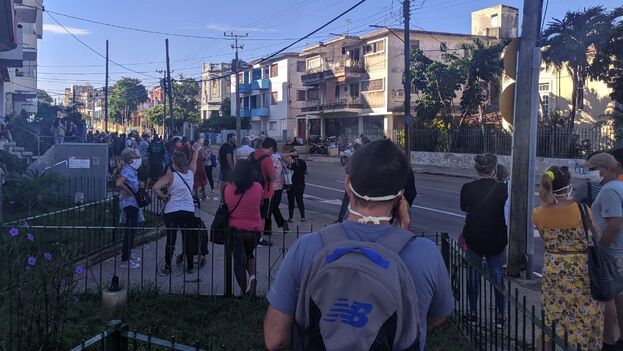
The frozen chicken, normally imported from the United States or Brazil, has become a national obsession these last months, and the lines to buy it, in strictly limited quantities, can last for days. There was an expectation that these supposedly “high-quality” shops would sell this type of meat.
In other provinces, the assortment is poorer than in the Cuban capital. The Zona+ shop in Sancti Spíritus didn’t have chicken; nor did it have detergent or oil. People decided to organize themselves with a view to the next few days in hope of a greater supply. “Let’s make a list for those who are waiting for new products,” recommended a customer.
“Hey, Mercedes, it’s the same old shit! There’s nothing, the only thing that’s changed is the money,” yelled an annoyed Santería woman from one side of the line. She said she had been there since 4:00 in the morning in order to, finally, “not enter the store, because they have nothing of what they said they were going to have.”
On the Boulevard de Sancti Spíritus, La Colonia, an old discotheque transformed into a CIMEX (Cuban army corporation) money exchange business, managed to attract dozens of the curious from early morning. The line is some distance from the entrance of the premises, and only customers in the vicinity who already have a ticket are let through. Each time someone comes out with a bag and walks a few steps, a nest of curious hornets falls on the person to ask questions.
“Do they have powdered detergent? What about toothpaste? Did you see if they have yogurt? How are the prices? Do you know if they have enough ground meat or if they got just a little?” The questions come from all sides. One woman with a serious face and nothing in her hands comes back through the door a few minutes after entering. “I stood in line for fun,” she announces in front of the grim expressions of the police, who are staked out along the whole street.
As far as prices go in the 74 new shops along the length and width of the country, customers complain that they are “higher than the exchange rate for CUCs to dollars” if you take into account the taxes in CUC of the shop merchants. But, yes, “everything was very clean, with air conditioning everywhere, and the employees were very friendly,” says a customer from the shop at Boyeros and Camagüey.
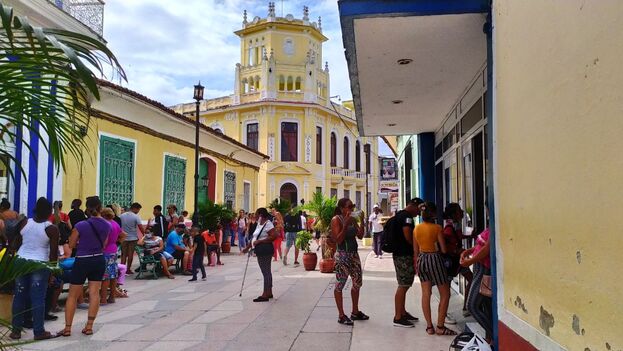
“I remember in the ’90s when they opened the dollar stores that all of them were really nice, but then they deteriorated little by little,” adds the same woman. “I don’t know how long this one will stay in good condition, but if it’s anything like the country, maybe 15 days. It all begins well and then half a month later doesn’t function. I came today even though I had to stand in line.”
A glass jar with 1.8 kilos of preserved white asparagus, of the Spanish brand Aldaketa, costs a little more than 68 dollars, practically the double of what this product sells for in other shops outside the Island.
Among the predominant brands are the Spanish Vima and Celorrio, in preserves, and Kiriko in personal hygiene and cleaning products. Also, the Gallo and Romero for pasta or Luengo for beans, packaged in Spain but produced in the Ukraine.
Translated by Regina Anavy
__________________
COLLABORATE WITH OUR WORK: The 14ymedio team is committed to practicing serious journalism that reflects Cuba’s reality in all its depth. Thank you for joining us on this long journey. We invite you to continue supporting us by becoming a member of 14ymedio now. Together we can continue transforming journalism in Cuba.
